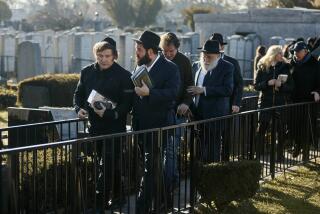NEWS ANALYSIS : Religious Leader’s View of Peace as Spiritual Issue Turns Tide : Politics: The rabbi’s small delegation abstains, setting the stage for Shamir’s downfall.
- Share via
JERUSALEM — A central figure in Thursday’s collapse of the government of Prime Minister Yitzhak Shamir wears gold-trimmed robes, a turban-like headdress, dark glasses and a prophet-sized beard.
When he speaks, this charismatic rabbi catches the ear of a large segment of Israel’s North African and Near Eastern community, the largest voting bloc in the country. He is Ovadia Yosef, and his stand in favor of peace talks shook the commonly held notion that the Sephardic community stands first and only for land acquisition, even at the cost of long conflict with the Arabs.
The aging spiritual leader of the ultra-Orthodox Shas party did what no other Israeli leader had been able to do: force Shamir to declare himself definitely on whether he would accept an invitation from U.S. Secretary of State James A. Baker III for peace talks with Palestinians.
When Shamir rejected the invitation, Yosef told five members of his Shas party in Parliament to abstain from voting on a no-confidence motion, setting the stage for the Shamir government’s downfall.
“Ovadia Yosef signaled the possibility that the Sephardic community views peace as a spiritual ideal. He rejected the craving for territory. And this can be very important,” said Yaron Ezrahi, a political analyst at Hebrew University.
When Israel held its last elections and religious parties won a record number of seats, analysts here viewed the phenomenon as exposing an irredeemable swing of the voters to the right of the political spectrum.
Yosef’s stand Thursday threw that common wisdom into question. The right-ward swing is more of a zigzag. The new ambivalence may make it possible for the center-left Labor Party to form a narrow government with the help of Shas and perhaps other religious parties once considered bound to Shamir’s Likud Party. Such a narrow government might then take the fateful step toward peace talks, experts say.
Observers suggest that the large Sephardic community, like other segments of Israeli society, are weary of the Arab uprising in the West Bank and Gaza Strip.
“The Sephardis have to serve in the army too, and they don’t like the duty in the territories any more than anyone else does,” said analyst Arye Naor, a former Likud official.
On Thursday, even the National Religious Party, a European-based group frequently associated with the territorial imperative, tried to persuade Shamir to accept Baker’s invitation, although its members supported Shamir’s government in the no-confidence vote.
The religious parties hold 18 seats in the 120-member Israeli Parliament.
How far any religious party will go on such a sensitive issue is open to question. Traditionally, the parties prefer to keep a low profile on issues of state, dedicating themselves to obtaining public money for schools and housing for their supporters.
In addition, religious leaders are wary of drawing the ire of Israel’s dominant secular population. Even peace activists were uneasy at Yosef’s prominent role Thursday.
“Sitting here are 120 representatives of the public, chosen by millions of voters, and the Knesset has to break up because the two largest factions have gone to meet with rabbis,” complained Yossi Sarid, a member of the leftist Citizens Rights Movement.
Yosef signaled change late last year when he pronounced himself in favor of a formula to give up occupied land for peace on the grounds that it is more important to save lives than keep territory.
At the time, the pro-Labor newspaper Davar called Yosef’s statement “the most significant event in Israeli politics in recent years.” Thursday’s vote was the first indication that Davar’s analysis may not have been far off.
More to Read
Sign up for Essential California
The most important California stories and recommendations in your inbox every morning.
You may occasionally receive promotional content from the Los Angeles Times.










